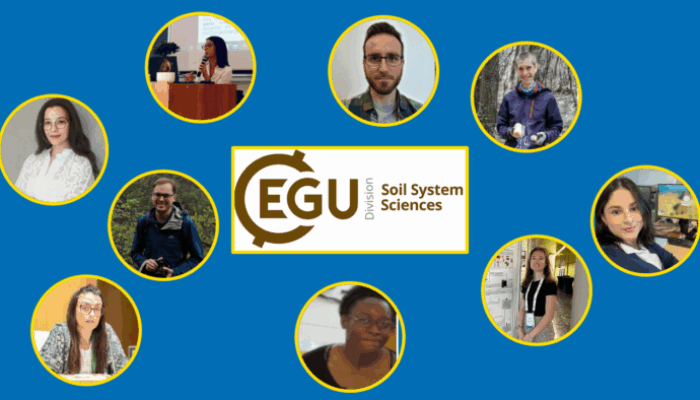
Soil is more than just dirt beneath our feet, it’s a living, breathing system that sustains ecosystems, regulates climate, and supports agriculture. At the heart of advancing our understanding of these vital systems is a dynamic group of early career researchers working within the Soil System Sciences (SSS) Division of the European Geosciences Union (EGU). In this post, we’re excited to introduce the Early Career Scientists (ECS) team of the SSS Division, an inspiring group of PhD students, postdoctoral researchers, and young professionals who are shaping the future of soil science.
Get to know the people behind the science and stay tuned for engaging stories, community updates, and soil inspiration! 🌍
General Planning
🌱 Beatrice Giannetta
Hi! I’m Beatrice Giannetta, Assistant Professor at the University of Foggia, Italy. My research focuses on carbon and nitrogen cycling in soils, including organo-mineral interactions, iron mineral transformations under redox conditions, and soil carbon sequestration. I also explore the sustainable use of waste biomass to improve soil health. As an ECS co-representative for the EGU Soil System Sciences Division, I’m committed to fostering collaboration and growth within the early career soil science community.
Blog Editors
🌱 Antonio Girona-García
Hi! I am Antonio Girona-García (he/him) and I am a researcher at the Biodiversity Research Institute (IMIB, CSIC–University of Oviedo–Principality of Asturias). My research has focused on understanding the effects of fire and forest management on ecosystems, with a particular interest in soil degradation processes. Currently, I lead research on the impacts of wildland fires on soils, including the assessment, mitigation, and modelling of post-fire soil erosion, as well as its role in the carbon cycle. Beyond research and soils, I’m passionate about mountains, photography, running, and board games.
🌱 Christhel Andrade Díaz
Hi, I’m Christhel Andrade, a postdoctoral researcher at INRAE (France) working at the crossroads of soil science, systems modeling, and climate policy. My research focuses on assessing carbon farming practices and land-based climate strategies using life cycle assessment and soil modeling, to support evidence-based decisions for sustainable land use and national bioeconomy transitions. I’m passionate about bridging science and policy by connecting soil processes to climate goals and translating models into actionable insights. Though my work is fully computational, I explore landscapes through data, simulating real-world scenarios to assess their long-term environmental impacts. Beyond work, I love hiking and discovering new places.
Social Media and Newsletter Team
🌱 Sana Boubehziz
Hi, my name is Sana Boubehziz, pre-doctoral FPI research fellow in the Soil Science Unit (Unidad de Edafología) at the University of Córdoba, Spain, my PhD work centers on sustainable soil management in Mediterranean ecosystems, specifically, soil health, ecological modeling, and the use of organic recycled materials (like compost, digestate, vermicompost) as phosphorus fertilizers in calcareous soils.
🌱 Perrine Florent
I’m a postdoctoral researcher driven by one core question: How do pollutants move through our agricultural systems, from air to soil and beyond? At Bangor University, I explore the journey of microplastics across global farming landscapes and their impact on soil health and crop productivity, helping build the science that shapes sustainable agriculture. My goal? To translate complex data into actionable solutions for cleaner, more resilient food systems.
🌱 Fatima Meite
Hi! My name is Fatima Meite. I’m a postdoctoral researcher in environmental biogeochemistry at University of Rouen Normandy, France. My research interests span below-ground processes occurring in natural and contaminated systems, with a focus on the interaction of microorganisms with minerals, and influence on pools, bioavailability and export of contaminants. Apart from my research, I enjoy practicing sport shooting, having the most plants everywhere, cooking and traveling.
🌱 Diana Vieira
My name is Diana Vieira. I am no longer an Early Career Scientist, however I joined the team to support the ECS team reaching out to a wider community of soil scientists. Currently I work as a Research Officer at the European Commission’s EU Soil Observatory (EUSO), where I am focused on soil health. My research path on assessing, predicting and mitigating the effects of fire on soil and water at European but also global scales. Moreover, I have dedicated time to knowledge transference and I strongly believe that art and technology should go hand in hand. I am also a fervent advocate for equity and diversity.
Campfire Meetings and Social Events
🌱 Marcus Schiedung
Hi, my name is Marcus Schiedung, and I am a PostDoc at the Thünen Institute of Climate-Smart Agriculture in Germany. I am a biogeochemist and soil scientist with a research focus on soil organic carbon and its cycling in natural and managed systems. At my current position, I work on the national agricultural soil inventory and study shifts in soil organic carbon composition and quality on a national scale. Overall, I aim to elucidate the complexities of soil carbon dynamics, spanning from the landscape to the micro scale, through a combination of field studies and laboratory experiments that account for the diverse nature of soils. Besides my research, I am passionate about cooking, music, and spending time in nature.
🌱 Marco Adami
Hello to everyone,
My name is Marco Adami. I am an Early Career Scientist. I have just got 1 year ago my Master’s degree in Natural Sciences. Until now, I mainly focused in water and atmospheric-derived pollutant modelling through forest soils. Currently, I work as pre-doc fellow in soil science at the University of Florence. In this project, I want to improve the soil water fluxes estimations derived from a Soil-Vegetation- Atmosphere Transport (SVAT) model in order to better evaluate also pollutant fluxes through the liquid phase in forest soils. In my free time, I enjoy hiking, doing sports and cooking.
.










